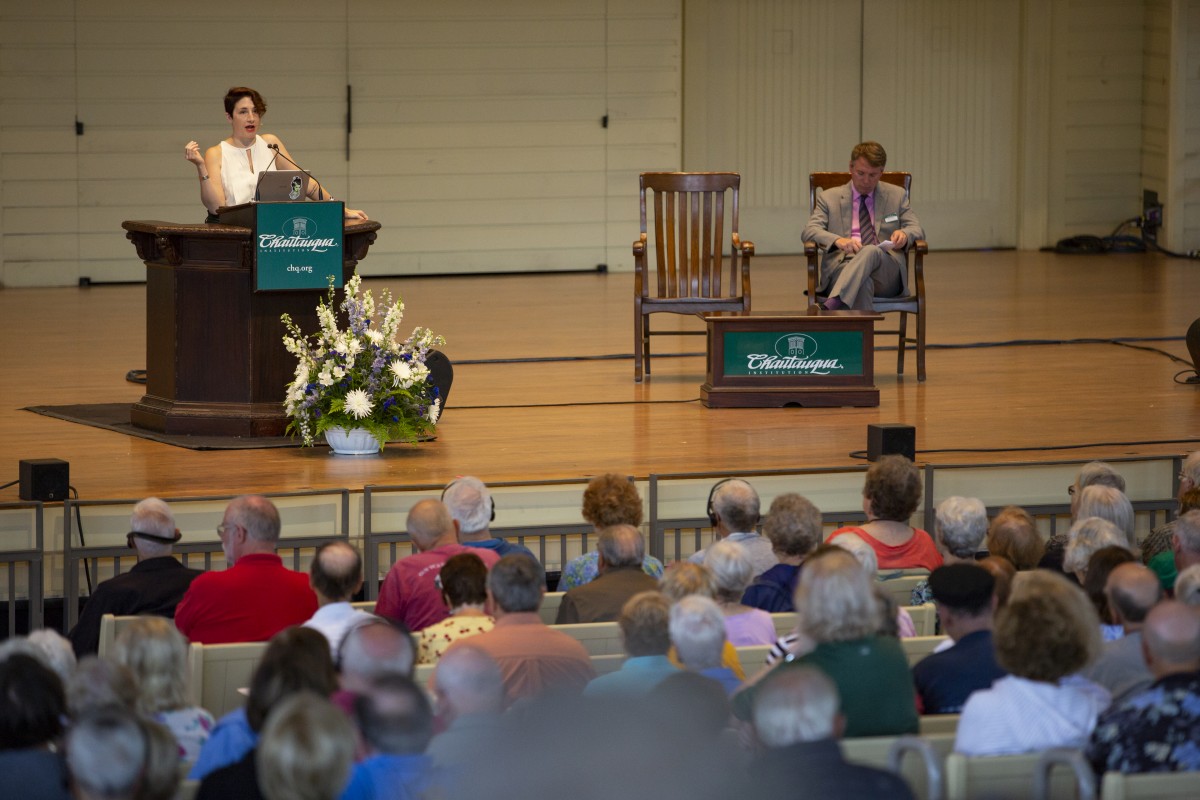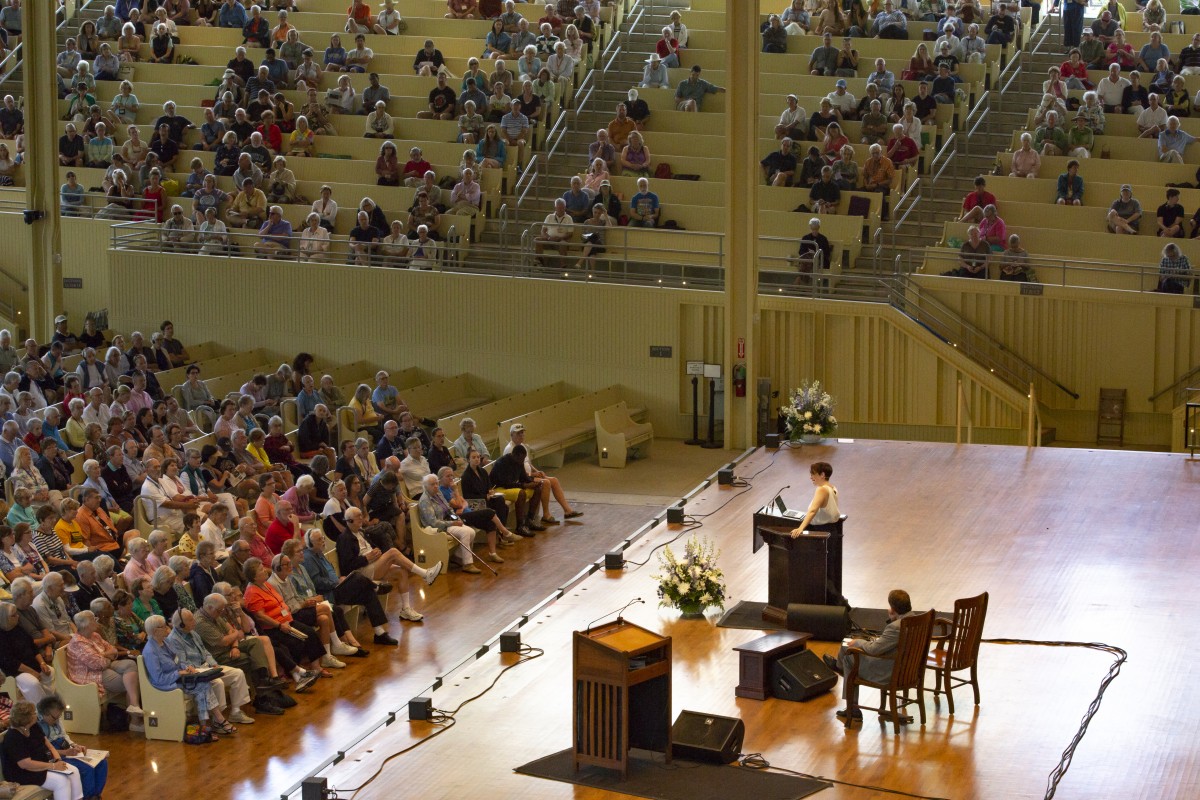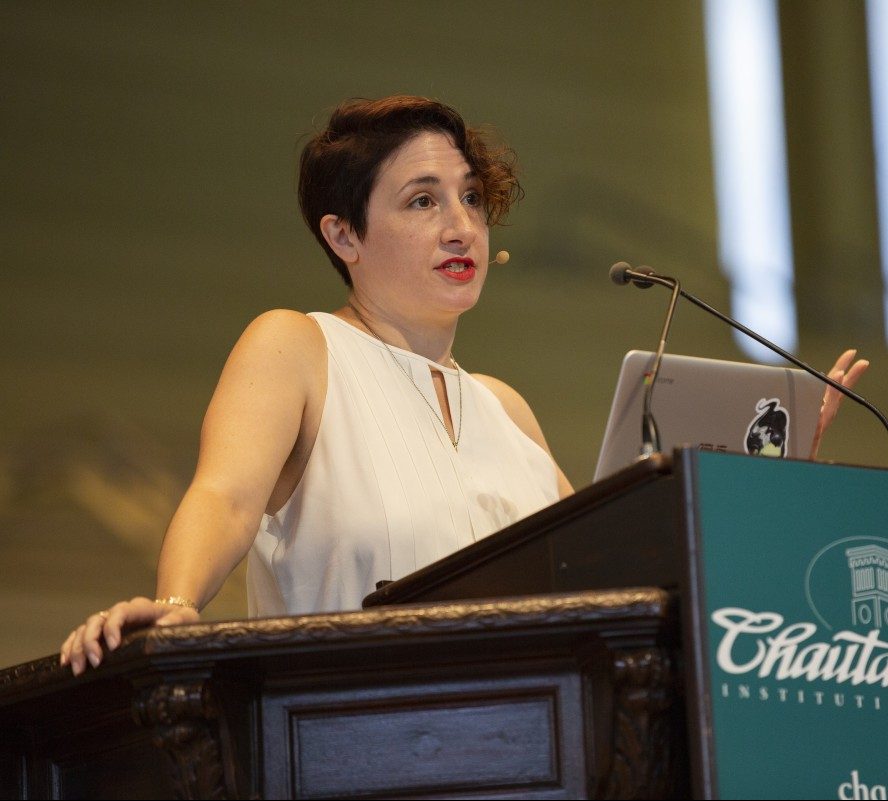Sarah Jaffe literally wrote the book on troublemakers — well, she wrote a book, Necessary Trouble: Americans in Revolt.
The author and journalist spoke to power, money as speech and the history of dissent movements in the United States at the 10:45 a.m. morning lecture Friday, July 27, in the Amphitheater, wrapping up Week Five’s theme, “The Ethics of Dissent.”
Jaffe covers labor, economic justice, social movements, politics, gender and pop culture with work in The New York Times, The Nation, The Guardian, The Washington Post and The Atlantic. Jaffe co-hosts Dissent magazine’s podcast, “Belabored,” and works as a columnist at The New Republic and New Labor Forum.
To open, Jaffe summed up her perspective on dissent with a quote from Irish socialist leader James Connolly:
“When her rebel sons and daughters were dead, hunted, imprisoned, hanged or exiled she would weep for them, pray for them, sigh for them, cry for them and when they were long enough out of the way, erect monuments to them. …”
When Jaffe visited Ireland in 2016, photos of Connolly were plastered everywhere despite his execution by the British for his role in the Easter Rising. His statement predicted his own future.
“When I think about dissent, and protest movements, social movements, troublemakers, which is what I wrote my book about, I think about that and the fact that we don’t often like the people who are making trouble,” Jaffe said.
The title of her book, Necessary Trouble, came to Jaffe after she interviewed U.S. Rep. John Lewis during the Dream Defenders’ 2013 occupation of Florida’s capital building after the death of Trayvon Martin. Lewis said, and Jaffe paraphrased:
“You’ve got to find a way to get in the way. You’ve got to make some good trouble — necessary trouble.”
This idea catalyzed her book, which examines social movements in America from the financial crisis of 2008 forward.
The 2008 crisis was a “rupture in the way we see the world,” Jaffe said. Decades earlier during the post-Soviet era, capitalism in the United States and around the world flourished. The threat of capitalism’s collapse proved otherwise, she said. As writer Mark Fisher put it:
“It is easier to imagine the end of the world than to imagine the end of capitalism.”
The recession caused bank bailouts, stimulus bills, efforts to slow “the tide of foreclosures” and attempts to keep the banks functioning. The end of capitalism was a real threat, Jaffe said, and leaders fought to keep it from crumbling.
From the crumbling of capitalism and the height of the 2008 financial crisis came a wave of protest movements. What began as a lie-in at the Chicago stock exchange that garnered national attention turned into the 2009 Tea Party protests that disrupted town halls and Senate meetings. And it worked.
In 2011, Occupy Wall Street tried to replicate this disruption.
“You had, from coast to coast in every state and most major cities, some sort of an Occupy encampment,” Jaffe said. “You had people marching on banks, on elected officials, trying to figure out how to disrupt shareholder meetings of the major banks. … It was an attempt … to actually call attention and figure out how to change the workings of American capitalism.”
Jaffe said Occupy Wall Street owed its tactics to Wisconsin’s “Rally to Save the American Dream” protests against Gov. Scott Walker’s legislation to strip public-sector workers of collective bargaining rights.
“Public-sectors workers, led by the graduate student union, didn’t like that idea,” she said. “So they took over the capitol building for three weeks. … They did what they could to disrupt the passage of this bill.”
As a journalist, Jaffe has spent much of her career reporting on unions, labor disputes and workers’ rights — most recently, the Janus v. AFSCME Supreme Court case, which threatens the freedom to form unions.
According to Jaffe, the Supreme Court determined in prior cases that corporations are more powerful than unions. Hence, Jaffe argued, money equals the right to speak — and this is not limited to the union-corporate dynamic.
Jaffe referenced Vermont Sen. Bernie Sanders’ campaign during the 2016 election as a Democratic socialist; she stressed that a century ago, socialism was not tolerated.
“You were not supposed to say those things in this country,” she said. “The reason you’re not supposed to say those things in this country is because a lot of people in a lot of powerful positions made a lot of effort to make sure we didn’t.”
The government undertook countless efforts throughout the 20th century to contain communists and socialists in the United States. It deported and arrested communist sympathizers; executed the Palmer Raids to capture, arrest and deport anarchists; banned radical literature; and created the 1947 Taft-Hartley Act to restrict labor unions. Hollywood blacklists and the McCarthyism of the 1950s were a “spectacle of things you weren’t supposed to say,” Jaffe said.
“(These events) changed the way we talked about things — to actually express the idea that inequality is a bad thing,” Jaffe said. “It became a lot harder to do when to do so got you called a communist — organizing interracial unions got you called a communist.”
The legacy of the Red Scare left America unable to think about the changing nature of national dialogue and capitalism, she said, and thus resulted in the eight richest men in the world controlling wealth equal to that held by the bottom 50 percent of the population.
McCarthyism attempted to narrow the scope of American thought. But since the 2016 election, that scope has been widened, Jaffe said. In the wake of Sanders, politicians like Alexandria Ocasio-Cortez — with once-taboo socialist agendas — are beating traditional politicians at the polls. The majority of younger people identify with socialism over capitalism, Jaffe said.
More recently, protest is seeping into everyday life; organized movements like the Women’s March, March for Science and the March for Our Lives swept across the nation this past year. However, Jaffe said, a physical, powerful, unorganized dissent took shape following the enactment of the U.S. travel ban. People rushed to airports to block security lines and gates; taxi drivers went on strike, refusing to take fares at the airport; and when Uber lowered its prices because of the strike, thousands deleted the app in rebuttal as part of a power struggle, Jaffe said.
Democracy is a power struggle — it doesn’t work for everyone, Jaffe argued; people’s policy choices are rarely ratified unless they align with a politician’s agenda.
“So the way that regular people are heard, that they get their preferences enacted, is to find a way to get in the way,” she said. “… We have to disrupt the status quo. We have to actually get unruly in order to get heard at all.”
Expect more dissent, she said.
After the conclusion of Jaffe’s lecture, Dave Griffith, vice president and Emily and Richard Smucker Chair for Education, opened the Q-and-A by quoting George Orwell. Griffith paraphrased: “When they are writing, one is either sinning by commission or sinning by omission.”
Griffith then asked what is the most compelling explanation Jaffe has heard to justify “sinning by commission” versus “sinning by omission.”
“What we have seen and what we will continue to see with President Donald Trump is a lot of people saying, ‘I can’t sit still anymore. This is not OK,’” Jaffe said. “… It is the question of ‘Am I just letting stuff happen because I’m admittedly comfortable?’ … You have to decide every day where and how to act and what risks you’re going to take, … and it’s not a simple thing to say, ‘I’m going to go out and I’m going to get arrested today as protest’ — it can affect the rest of your life.”
Griffith turned to the audience for questions; one attendee asked if there is recourse after Trump throws a reporter out of a press conference.
The short answer, Jaffe said, is no.
“The Trump administration is a little more honest about kicking people out when they ask a question they don’t like as opposed to just calling on them or giving them an artfully constructed non-answer,” Jaffe said. “But to actually do real journalism anyway, you have to find out what those people don’t want you to know, rather than the things they want you to know.”
To close the lecture, an audience member asked if power, money and hierarchies always win.
“I think there are more of us than there are of them,” Jaffe said. “… I think we have to believe it is possible in order to be willing to act. … One of the things that it takes for people to decide to get up and do something is obviously anger, frustration and the need to express something, but you also have to believe you can change things.”







